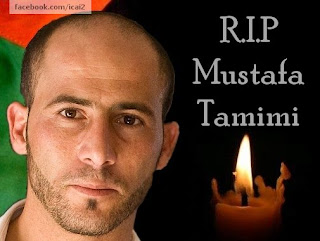“Isn’t that what Mustafa fought for? Didn’t he fight for his land, and this spring? And that’s what we’re going to do.”
Ibrahim’s eyes were flashing with a determination emerging from deep within. Emerging from years of being humiliated, stripped of his basic human rights, from witnessing colonization and the ethnic cleansing of his home village, Bil’in. Years of being harassed and attacked for wanting basic human rights, for wanting freedom. Gesticulating widely, he told us of today’s plan:
To head and reach al-Kaws spring. Not only will we attempt. We will.
Simple, right?
Wrong.
In any other country in the world, heading to a water spring would be as casual as a walk in the park. It is a natural phenomenon, after all, in which water from underground gushes to the land’s surface; clean natural water that can serve an entire village.
But we are in Palestine. Something as heading to a spring of water can be a life-threatening experience, with extremist illegal settlers living in Jewish only communities and Israeli “security” forces ready to attack (or as they believe, defend).
God’s chosen people.
When the illegal* settlement of Halamish was built right on the village of Nabi Saleh, al-Kaws spring, which was the village’s main water supply, was seized by fascist arms, adding that incident to a list of offenses carried out by the Zionist entity. Our attempts of rightfully drawing water from the spring, or going anywhere near it for that matter, are met with brutality and violence by IOF (Israeli Occupying Forces), whom make it their duty to guard and protect any thieved settler possession. Even if that means to attack, injure, and in the case of Mustafa Tamimi, kill anyone who attempts to defy such illegal actions.
“International! International! Ya jama3a!”
Ibrahim’s voice sounded above everyone else’s.
“All together now, all of us, down to the spring!”
A few eager demonstrators, Palestinian, Israeli and international, followed suit.
“Last time we were only 15! We need all of us to go now! All of us! 3annab3a, 3annab3a! To the spring!”
A few more activists joined. Many others stayed on the street. I honestly don’t know why.
What is the point of demonstrating in Nabi Saleh? Is it just to get a few good pictures, gloat to friends of teargas and skunk water, and to say that you stood unarmed in front of a military jeep?
I thought of Ibrahim’s determined face the morning of the demonstration. “Isn’t that what Mustafa fought for? So we’re going to go down to the spring, and put his picture on it. That is what we’ll do today. That is our goal.”
I can only hope that a revolutionary change will come to Palestine, one confiscated village at a time. To do that, we must not run. We must not flee. We must not hesitate. This Friday was in honor of Mustafa, in honor of a hero, a Palestinian martyr that lost his life for a cause..a free Palestine, where heading to a spring is nothing more than a walk in the park. Where basic human rights exist, to everyone. Where Palestinians can live in peace and harmony without worrying where the Israeli soldiers will shoot next. Without worry of being arrested and treated as a criminal. Yes, the IOF inhumanely attack us with teargas canisters aimed at head level, but aren’t we all Mustafa? Aren’t we loyal to him? Won’t we show him that his death wasn’t in vain?
We must be fearless. We must march forward. We must resist. We must become the revolution.
To all activists, Palestinian, Israeli, international, please make use of your time at Nabi Saleh. We must head toward our stolen spring, our dispossessed land, in hoards, in crowds of hundreds, thousands, millions.
I thought of those of us who managed to get closest to the spring before IOF began their usual brutal "Gas the Arabs! And all those who stand with them!" policy. We were a maximum of twenty. I thought of how together, we formed a human chain to resist physical attack from IOF. I thought of activists that actually reached the spring, and were arrested one by one. I thought of Jonathan Pollak’s last words as he was being dragged to an Israeli military jeep following his arrest..”revolution until victory!” I thought of sacrifices one has to make for the ultimate prize we so eagerly yearn for…freedom from oppression.
If Mustafa did it, why can’t we?
Dec.17.2011
*"International humanitarian law prohibits [an] occupying power [from transferring] citizens from its own territory to the occupied territory (Fourth Geneva Convention, article 49). The Hague Regulations prohibit the occupying power [from undertaking] permanent changes in the occupied area."


